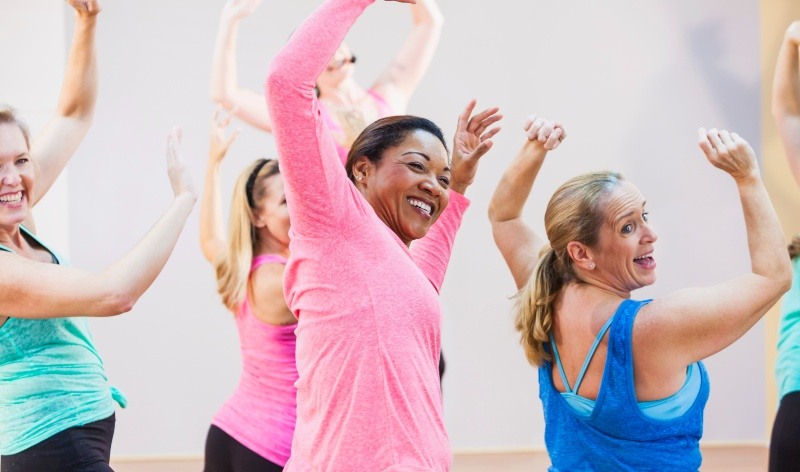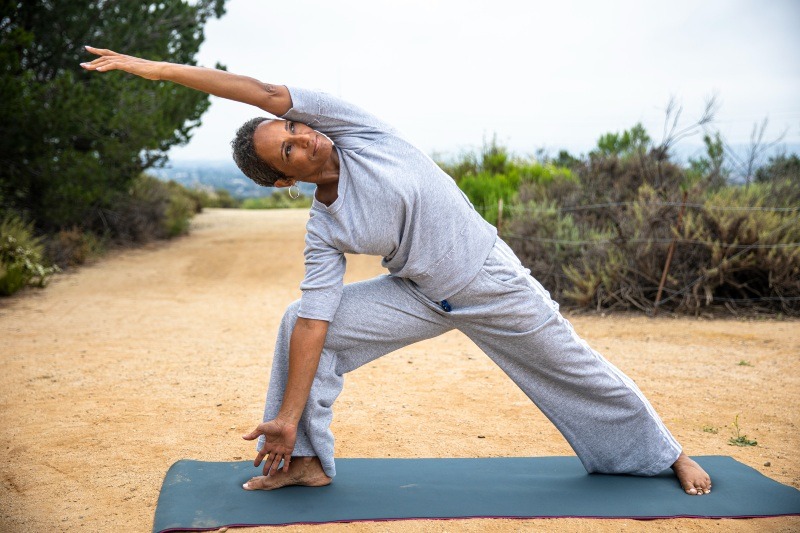- Home
- Mind & body
- How to ease your way through menopause
At CBHS we help you manage your health challenges. We believe in offering you the services, support and tools you need to live your best life.
Health and Wellness Programs are available to support eligible members towards a healthier lifestyle. Each Health and Wellness Program is subject to its own eligibility criteria.
Contact us for more information and to confirm your eligibility for a program.
How to ease your way through menopause

For some women, the onset of menopause can be a moody, life-altering and physically challenging time in life. But it can herald the arrival of a reinvigorating new life chapter that holds promise, greater clarity and renewed emotional strength.
Your experience of menopause will be unique and personal to you, your body, lifestyle and emotional make-up. But it is possible to survive and indeed, thrive through this time of flux and renewal.
How your life may look as menopause begins…
The transition to menopause often coincides with other life changes including:
- Children might be leaving or they’ve already left home
- You have an ‘empty nest’ and are spending more time with your partner
- Maybe you’re looking for a new partner!
- You’re caring for elderly parents
- Your career is ramping up or winding down.
These changes can add stress to your life combined with how you’re feeling about your changing body. So, it’s normal to feel overwhelmed and challenged as you try and adjust to the physical and emotional changes in your life.
It’s only natural
While menopause is a natural occurrence for all women, a lot of mystery, fear and confusion surrounds it too. The truth is, your body is going through a lot of changes, physiologically, emotionally but also socially. However, there are steps you can take to navigate this time including:
- Eating healthy
- Exercising regularly
- Focusing on your self-care.
The symptoms
- Disrupted sleep: you’re awake more frequently and for longer
- Night sweats
- Mood swings
- Anxiety
- Brain fog: lack of focus
- Irregular bleeding
- Joint pain
- Incontinence
- Low libido
- Vaginal dryness
- Painful sex.
Depending on your genetics and ethnicity, you may feel all or some of these symptoms.
- 20% of women will have mild or no symptoms
- 60% will have distressing and even debilitating symptoms
- 10-15% of women may continue to have symptoms into their 60s and 70s.
Whatever your experience, the lead up to menopause involves many biological changes and they’re all related to your hormones.
“You can survive – and thrive – through menopause by paying closer attention to your diet, exercise and self-care.”
Stages of menopause
Just like puberty, menopause comes on gradually. In fact, it’s a process that happens over many years. However, unlike puberty, menopause is the book-end of our reproductive years.
Stage One:
Peri-menopause usually occurs in our mid-40s and it’s the lead up to the last menstrual period. This stage is generally only experienced with spontaneous (natural) menopause and not induced menopause which can occur
earlier due to disease, surgery, radiotherapy or chemotherapy.
- Ovulation is erratic: you don’t have as many eggs.
- Oestrogen and progesterone levels fluctuate on different cycles.
- Hormones are in a state of flux.
- You may experience ‘heatwaves’ such as hot flushes or night sweats.
- Unexplained mood swings: tears, irritability, sadness.
Stage Two:
Natural menopause generally ‘begins’ 12 months after a woman’s final period with the average age of menopause in Australia being 51.
- Medically, this is the ‘permanent pause’ in menstruation.
- The word menopause originates from the Greek ‘mens’ for month and ‘pausis’ for cease.
Menopause can also be brought on if you’ve had a hysterectomy, oophorectomy (ovary removal) or other medical procedures. If you detect the symptoms of menopause sooner (age 40 is considered early), speak with your doctor for support in managing the symptoms sooner rather than later.
Stage Three:
Post-menopause is the final stage and basically means you’ve entered the next stage in your life. Menopausal changes and symptoms have ended but this time can be as exciting and as meaningful as you want it to
be!
“Put the focus on your physical and emotional health and make menopause the start of an exciting, healthy new chapter in your life.”
Menopause has arrived. Now what?
The onset of menopause will bring about many physiological changes in your body mainly due to a decrease in oestrogen which helps to regulate your moods and keep your bones healthy.
When this hormone drops, your brain will respond by stimulating more hormones – that’s why you’ll feel the ‘rollercoaster’ of peri-menopausal symptoms including:
- Stress and anxiety
- Difficulty sleeping
- Increased risk of osteoporosis
- Weight gain
- Loss of muscle mass.
While post-menopause may feel like an all-consuming and stressful time in your life, it’s important to remember there are things you can do to manage your physical and mental health both now – and into the future.
How to survive – and thrive – through menopause
There are a lot of changes you can make in your life that will empower you both physically and emotionally during menopause and beyond.
However, every woman is different, so what may work wonders for your friend, may not help you at all. That’s why it’s a great idea to stay as informed as possible during the process and keep up to date with your GP appointments for further support and guidance – tailored to you.
Add key nutrients to your diet
While a diet rich in fresh fruit, vegetables and protein is always vital, it’s particularly important during menopause and beyond.
- Vitamin D, calcium and magnesium are high bone building minerals which will maintain your bone health and prevent bone loss.
- So, pack your diet with fatty fish like salmon, and nuts like almonds and cashews.
Keep the carbs!
As you transition into menopause, you may experience sudden weight gain and find it difficult to control your blood sugar – that’s where adding good, unrefined carbohydrates to your diet can help balance insulin levels and control the weight gain side effects.
- Choose brown rice instead of white
- Add quinoa and bulgur wheat to your meals
- Experiment with freekeh and legumes.
“Post-menopause may feel all-consuming and stressful but staying informed and up to date with your GP appointments can help.”
Up the protein
During menopause, the natural decline in your oestrogen levels can cause a loss of muscle mass and strength. That’s why it’s so important that you get enough daily protein to help prevent muscle loss, balance your blood sugar levels and maintain a healthy weight.
- Add lean proteins like chicken breast or tuna to your meals
- Yoghurt, cheese, quinoa or beans are also beneficial.
Healthy fats
Yes, there’s such a thing as ‘bad fats’! Burger and fries anyone? But good fats can be just as tasty and satisfying. What’s more good quality fats like omega-3 and omega-6 fatty acids can lower your risk of both health disease and breast cancer. They can even help with your focus and concentration. But you needn’t be too rigid in your diet choices: fries in moderation are fine!
- Healthy, satisfying fats are found in avocado, extra virgin olive oil, chia seeds and oily fish.
Feel the benefits of phytoestrogens
During menopause, your oestrogen levels will decrease which will result in those unpleasant hot flashes. However, the phytoestrogens found in soy, wholegrains, legumes, seeds and nuts can actually help to reduce your symptoms.
- Enjoy soy in edamame, tempeh, tofu
- Oats, barley and brown rice
- Chickpeas, beans, lentils
- Flaxseeds, sesame and sunflower seeds.

Get physical
It’s easy to overlook the simple act of just moving your body to keep healthy, fit and active during menopause. But it’s such an important part of this time. And while any exercise is good exercise, weight-bearing exercises like strength training is essential to keep your bones strong.
- Add light weights or exercise bands to your exercise regime
- Work your upper and lower body equally, twice a week if you can
- Regular brisk walking and stretching is a great way to stay supple
But it’s not all about strength-based training. Exercises that promote good balance like yoga and tai chi are important too. They can also help to reduce your stress levels as well as improve your fitness and mood.
What’s more, staying physically active can help minimise the severity and frequency of hot flashes and night sweats.
How to keep calm – even when you don’t feel like it
Women who feel particularly anxious during menopause may experience more pronounced symptoms than those with the lowest anxiety levels. And while it isn’t always easy to control your moods when your hormones are in a state of flux, you can be kinder to your body and mind in the following ways:
- Breathe: deep breaths from your abdomen rather than your chest can help ease anxiety and reduce hot flashes
- Yoga: a regular, gentle practice is great for your mind – and body
- Meditate: a few minutes a day can help calm your moods
- Journal: regularly writing down your feelings can ease the burden of fluctuating emotions during menopause.
“Any exercise is good exercise during menopause – but adding weights to your regime will be particularly beneficial.”

Turning down the heat on those hot flashes and night sweats
Hot flashes and night sweats are among the most frustrating aspects of peri- menopause and menopause. You never know when the heat will hit. You may wake up bathed in sweat, feeling like an oven tonight – but feel fine tomorrow.
Here are a few tips that can help alleviate this sweaty time:
- Dress in layered, light, natural fibres designed to “wick away” moisture
- Keep your home – especially your bedroom – as cool as possible
- Avoid heavy bedding and use lightweight sheets and blankets
- Quit smoking
- Find a healthy weight
- Explore ways to reduce anxiety and stress: meditate, practice yoga.
Pay attention to your pelvic floors
As you go through menopause, your pelvic floor muscles (like most muscles in the body) will tend to weaken. You may want to pee more often and even find it harder to ‘hold on’ between loo visits. Flatulence may also be an issue!
Some tips to stay drier for longer (!)
- Pelvic floor exercises: practice squeezing and holding your pelvic muscles
- Watch your water intake: aim for 1.6 to 1.8 litres a day
- Achieve a healthy weight: less excess kilos can improve bladder control
- Train your bladder! Wait until you really need to go.
Of course, if these initial strategies don’t help, you can always speak with your doctor to see if medication or surgery are options.
Embrace this new chapter in your life
Menopause is the end of one life cycle, but it’s also a fresh start to another… and while the symptoms and discomfort can be challenging, they can also be managed with a few lifestyle and diet changes. That’s why it makes sense to stay in regular contact with your GP or gynaecologist for any extra support and guidance. You don’t need to navigate this physical evolution alone. It’s also important to pay attention to other changes in your life because they could contribute to what you’re experiencing.
While it may not feel positive at the time, the transition into menopause really can be an incredible opportunity to begin a new chapter in your life: it’s a time of renewal where you can focus on yourself, your body and creative life in a way that puts your physical and emotional needs first. And that’s certainly something to celebrate.
Visit our women’s health section for more tips and information on enjoying good physical and mental health whatever your life stage.
All information contained in this article is intended for general information purposes only. The information provided should not be relied upon as medical advice and does not supersede or replace a consultation with a suitably qualified healthcare professional.
Sources:
https://www.cbhs.com.au/mind-and-body/blog/how-to-slow-down-and-top-up-your-health-and-wellbeing
https://www.cbhs.com.au/mind-and-body/blog/embracing-the-natural-flow-of-life-with-meditation
https://www.cbhs.com.au/mind-and-body/blog/curb-your-cravings-how-to-resist-those-snack-temptations
https://www.betterhealth.vic.gov.au/health/conditionsandtreatments/menopause
https://www.continence.org.au/who-it-affects/women/menopause
https://www.healthdirect.gov.au/incontinence-treatments
https://www.cbhs.com.au/mind-and-body/blog/embracing-the-natural-flow-of-life-with-meditation
Health and wellbeing
programs & support
You Belong to More with CBHS Hospital cover:
- Greater choice over your health options including who treats you
- Get care at home with Hospital Substitute Treatment program
- Free health and wellbeing programs to support your health challenges
Live your healthiest, happiest life with CBHS Extras cover:
- Benefits for proactive health checks e.g. bone density tests, eye screenings
- Keep up your care with telehealth and digital options
- Save on dental and optical with CBHS Choice Network providers

